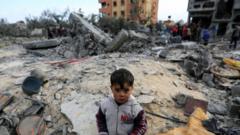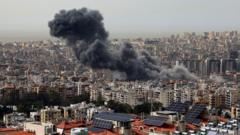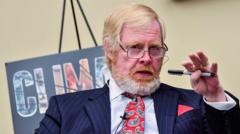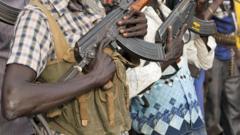In a striking display of public dissent, hundreds in Beit Lahia rallied against Hamas, demanding the group's resignation. Despite violent intervention from Hamas militants, protesters expressed their anger over the humanitarian crisis exacerbated by the ongoing war. This demonstration highlights a shift in sentiment among Gazans as the conflict with Israel continues.
Growing Public Dissent: Major Anti-Hamas Demonstration Erupts Amid Ongoing Conflict
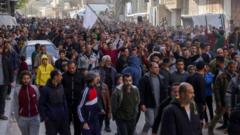
Growing Public Dissent: Major Anti-Hamas Demonstration Erupts Amid Ongoing Conflict
Tensions rise in Gaza as hundreds take to the streets in protest against Hamas, marking the largest anti-Hamas demonstration since the war began.
In a significant turn of events, hundreds of protesters took to the streets of Beit Lahia for the largest anti-Hamas demonstration since the onset of the war with Israel. Demonstrators voiced their demands for Hamas to relinquish power, chanting slogans like "out, out, out, Hamas out." The protest unfolded under the watch of masked Hamas militants, some armed, who intervened violently to disperse the gathering, resulting in several injuries among participants.
Activists shared footage on social media showing the crowds marching and chanting, reflecting a rising dissatisfaction with Hamas's governance amid the ongoing conflict. The protests erupted a day after an attack by Islamic Jihad gunmen against Israel sparked Israeli military responses, resulting in public anger regarding safety in the region. Amidst this backdrop, Hamas issued statements condemning the dissenters as agents of suspicion, suggesting their motives may serve foreign interests rather than local grievances.
The conflict has led to unprecedented suffering in Gaza, with the resumption of military operations causing widespread casualties and displacement, with over 50,000 Palestinians reported dead since fresh airstrikes began on March 18. Beit Lahia resident Mohammed Diab, who lost his home and brother to earlier airstrikes, was one of many expressing frustration, stating, "We refuse to die for anyone." Demonstrators further called for an end to Hamas's rule, highlighting historical discontent, which has resurfaced amid the chaos of war.
Despite the marked protests and challenges Hamas faces, public opinion remains difficult to gauge due to fears of repression. Activist Mohammed Al-Najjar criticized Hamas's reliance on the people, emphasizing the need for accountability and a shift away from continued suffering. Hamas authorities acknowledged the right for citizens to express their pain but insisted on protecting the group's image and legitimacy.
This protest is indicative of evolving sentiments in Gaza as public awareness and discontent grow in a time of crisis, challenging Hamas's longstanding authority since it took control of the region in 2007 following a significant electoral victory. The situation continues to develop as Gazans grapple with increasing violence and calls for change amidst humanitarian disaster.




